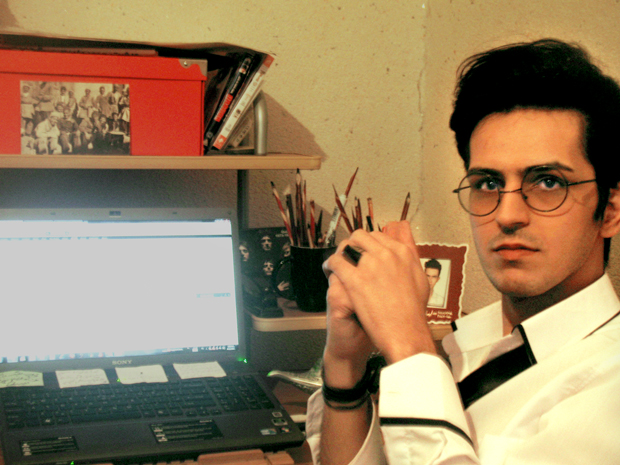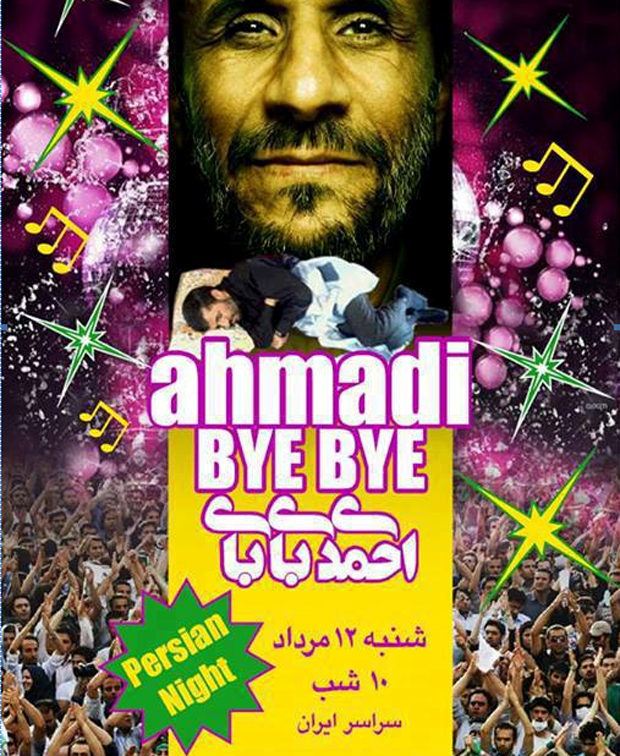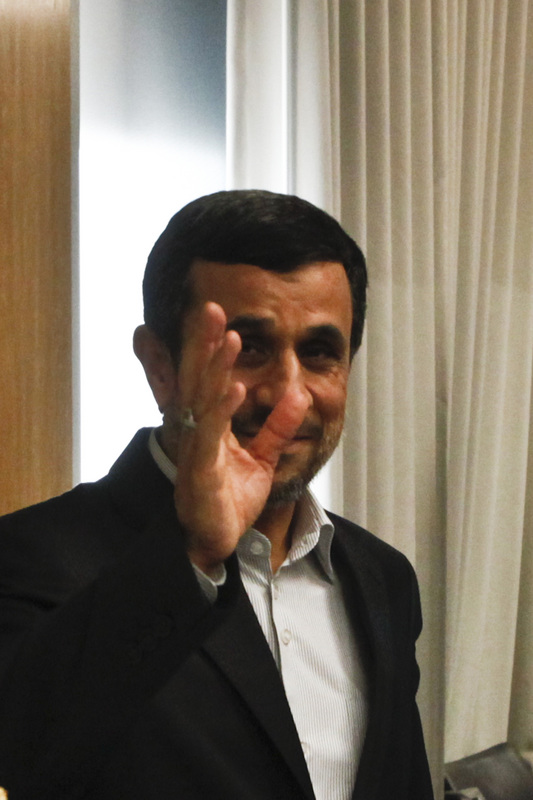14 Aug 13 | Iran, News and features, Politics and Society, Religion and Culture

Payam Feili (Photo: Nogaam)
Iran’s government has been increasing pressure on writers and artists over the past few years, but its heavy hand does not strike evenly.
Iranian poet Payam Feili, who is a gay man, is the victim of a brutal system. He was fired from his job, his translator’s house was ransacked, and the censors have shunned him.
Isolated in Iran, Feili has dedicated himself to writing. He says he lives among his ideas, a citizen of his mind: “I’m writing on the edge of crisis but I think I am doing fine. I’ve gotten used to life being full of tension, horror, disruption and crisis”.
Born in 1983, in Kermanshah, a city in western Iran, Feili has faced insurmountable obstacles as an author who, with pen as sword, is fighting back against social, cultural and political taboos. Despite the endorsement of renowned Iranian Simin Behbahani and the backing of one of Iran’s biggest publishers, Feili’s work has only once emerged from the Ministry of Culture and Islamic Guidance with a seal of approval.
Feili’s first book, ‘The Sun’s Platform’, was published in Iran in 2005, but dozens of other works submitted to the ministry have been refused publishing permission. Payam is blacklisted, not just for his words, but for his sexual orientation.
“They refused my books, one after the other, without any explanation. They have a blacklist of authors who are simply not allowed to publish anything. Even my apolitical non-religious works, works of pure poetry, were banned. There’s nothing scary about them, but the state authorities are afraid of everything”
Observing his sharply delicate words falling from the pages of history unread, Feili began publishing his books outside Iran, knowing all too well that he was endangering himself. Officers from the Ministry of Intelligence ransacked his translator’s house and threatened him, forcing him to sever ties with Feili. After gaining notoriety abroad, the company Feili had worked for fired him without good cause. With the odds stacked against him, Feili insists on exercising his right to freedom of speech.
“If you read my books, it’s obvious I have not succumbed to self-censorship. My poems are bold and fearless. I don’t allow anybody, not me, not others, not even the Ministry of Culture and Islamic Guidance to censor my books”
Many are hoping for Rouhani’s presidency to bring around the cultural thaw that characterised Khatami’s two terms. Feili has not been swept up by the wave of hope that has captured his peers.
“Nothing essential has changed. The structure is still the same. It’s a play, a comic and ugly performance. They’re relying on the naivety of people to be able to succeed”
Embittered by 30 years of living in exile within the borders of his country, as a homosexual, and as a writer that challenges the status quo, Feili is now dedicating his time to securing funding to translate his poetry for audiences outside Iran.
“I’ve learned a lot and I know what’s going on in Iran. I know that when my homosexual narrative is woven through my words and there is a Star of David on the cover of my book, the censors won’t even bother opening it to find out what is inside. I just want to be published. I know the audience outside Iran is different, but I just want to be heard”.
This article was reported by Nogaam, a publisher of Iranian books and authors that have been censored, banned or blacklisted. Nogaam relies on donations from readers to publish their books for free download on their website. Payam Feili’s book ‘White Field’ was first published in Persian by Nogaam in London in July 2013. The publisher is currently seeking support to help Payam translate his poems, and fulfil his simple goal of being heard.
I Will Grow, I Will Bear fruit … Figs (First Chapter)
ONE
I am twenty one. I am a homosexual. I like the afternoon sun.
My Apartment is in the outskirts of town. Near the wharf. In a place that is the realm of seashells, the realm of corals, adjacent to the eternal sorrow of the turtles.
My mother lives in the waters. In the remains of an old ship. On a bed of seaweed. Her hair blazes like a silver crown above her head. My mother is always naked. She visits me every now and then. At my apartment in the outskirts of town.
She first crosses the wharf. She floats in the scattered scents of the bazaar. Then she pays a visit to the crowd of fishermen in the seaside cafés. Among their wares, a hidden pearl. And she leaves them and heads for my bed. Of course, along this entire route, she is no less naked.
Poker; that is what I call him. He is my only friend. We met during military training. He is twenty-one. He likes the afternoon sun and he is not a homosexual.
I consider this a threat. I have never talked to anyone about my sexual inclination. In fact, I hide it. Even from my few sexual partners. With them, I pretend it is my first such experience.
My sexual partners are night prowlers. Strangers. Poker is not a night prowler. Poker is not a stranger. And this is chipping away at me from the inside!
Payam Feili
Translated from the Persian by Sara Khalili | This translation appears on Feili’s blog.
This article was originally published on 14 Aug, 2013 at indexoncensorship.org. Index on Censorship: The voice of free expression
05 Aug 13 | Iran, News and features

Iranians stormed the streets in celebration when his victory was announced, and this giddy optimism also permeated social media.
In the days after the election, there was an opening up of the national media, which has been steadily strangled over the past 8 years, as reporters and journalists tested the new waters to measure where the new limits of censorship have been set.
On July 23 the Iranian Students’ News Association announced Rouhani’s government may lift the filter from Facebook and other social networks, but after going viral, the article was deleted without explanation.
Iranians on social networks have started a campaign called “Rouhani, Mochakerim” [Rouhani, Thank You], a platform on which they seem to thank the new president for everything good in their everyday lives. One said, “I think Facebook needs to have a ‘Thank You Rouhani’ button” for Iranians”. Another quipped, “My phone’s had more battery life since Rouhani won the elections. Thanks Rouhani!”
Blogger Younes is very optimistic about Rouhani and hopes Iran’s relationship with other countries will be improved over the next four years. Younes described how Ahmadinejad’s foreign policies united the world against Iran. He pointed out that the invitations to Rouhani’s inauguration were sent to world leaders signalling that Iran is ready to change its position and open up dialogue with the outside.
Optimists aside, there are also those who are unsure whether Rouhani will be able to keep his promises. Twitter user thebrightriver has criticised Rouhani for the ministries he has proposed to the Parliament: “Rouhani has promised that he will create the Ministry for Women, but he hasn’t even chosen one woman as a minister! It’s good I didn’t vote otherwise I’d owe one to my conscience”.
Mohammad Hosseini Nejad argues Rouhani is not a magician, that radicalism is the biggest threat to his ability to fulfil his promises, and that his policies will only be implemented if all of the opposition factions join together to support him.
Rouhani’s victory has also created space for Iranians to publicly satirise Ahmadinejad. On Friday, Iranian Twitter users ridiculed Ahmadinejad’s government using the #AhmadiByeBye hashtag, and sent an invitation to social media users to attend Ahmadinejad’s Goodbye Party on Saturday, 3 August 2013.

Farzad said, “Ahmadinejad has claimed that he fought economic corruption, but everyone connected with him was involved in the biggest embezzlement in Iran’s history. #AhmadiByeBye” Hooman agreed, “These 8 years have shown me how just one mistake can destroy life of an entire generation. #AhmadiByeBye”.
While the atmosphere, at least on social media, is one of optimism, Rouhani’s road ahead is tough. For the next four years he will battle against the supreme leader and the Parliament to implement some of his more ambitious promises. Despite being a figurehead for Iran when it comes to the country’s public relations, the president has relatively limited power and will struggle to liberalise the country.
This article was reported by Bronwen Robertson and Amin Sabeti of Small Media. Small Media has collaborated with the Munk School on launching ‘Rouhani Meter’, where Rouhani’s policies will be tracked across the first 100 days of his candidacy and beyond.
18 Jun 13 | Middle East and North Africa
August will mark the end of our time with Mahmoud Ahmadinejad, Iran’s president since 2005. His successor, moderate cleric Hassan Rohani, was announced as the winner of this year’s election over the weekend.
 Ahmadinejad, the Islamic Republic’s sixth president, brought along with him an aggressive foreign policy and a penchant for controversial statements — from
Ahmadinejad, the Islamic Republic’s sixth president, brought along with him an aggressive foreign policy and a penchant for controversial statements — from
questioning the Holocaust, to denying the existence of homosexuality in Iran, to claiming that the United States developed HIV to profit from African nations.
His time in office has been marked with many arbitrary arrests and restrictions on freedom of expression. During his first term, 14 publications were shut down, including newspaper Sharvand Emrooz (Today’s Citizen), closed for using an image of the then newly-elected US President Barack Obama on its front cover.
His re-election in 2009 sparked popular protests that became known as the “Green movement”, as demonstrators alleging that the result was fraudulent filled the streets. They were met with a brutal crackdown.
The aftermath of the election brought a rise in attacks on journalists and press freedom, according to the Committee to Protect Journalists (CPJ). As of December 2012, the organisation reported 45 journalists in prison.
Iran has also gained a reputation for online censorship, named one of the “enemies of the internet” by Reporters Without Borders (RSF). In 2010, the country created a “Cyber Army” to police the web. Following the disputed 2009 election, Facebook was banned in Iran in the name of curbing social unrest. Also in 2009, the country formed the “Organised Crime Surveillance Centre”, which according to RSF, has been used to pursue netizens.
Ahmadinejad also leaves behind a legacy of cultural censorship. According to a 2011 report published by information activists Small Media, Iran’s government “has become increasingly draconian in the imposition of restrictions and the implementation of new policies concerning the publication of books” following 2009’s election. Small media contend “there has been no other comparable era of such heavy-handed suppression since the instigation of the Islamic Republic in 1979.”
At the 2010 Tehran Book Fair, books approved published before 2007 were banned from being sold. Raha Zahedpour wrote for Index about this year’s fair:
“No one in the industry can anticipate what will and will not be allowed by Iran’s Ministry of Culture and Islamic Guidance. Completed projects wait for months to be reviewed by state censors and most are returned with a long list of “required modifications.”
Iran’s system of censorship, combined with international sanctions have “put the publishing industry under intense pressure” according to Zahedpour.
The country’s film industry has also been crippled by its censors: independent as well as pro-reform filmmakers face punishment or jail time, while films with a regime slant receive financial backing. Filmmaker Jafar Panahi, for example, received a six-year jail sentence for “colluding in the gathering and making of propaganda against the regime” in 2010, as well as a ban preventing him from making films or traveling abroad for 20 years.
It’s not known what the outgoing leader’s next steps will be: he could stand trial in November, following unspecified complaints brought against him by Parliament Speaker Ali Larijani, a conservative rival. But some believe that the 56-year-old will not leave the political arena easily.
Sara Yasin is an Editorial Assistant at Index. She tweets from @missyasin




